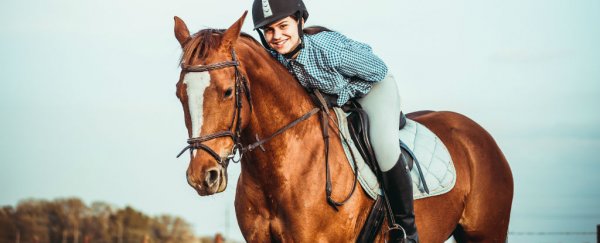A Seattle woman has died from a serious respiratory infection that health officials have linked back to the horse she was riding during a two-day retreat.
Although it's an extremely rare occurrence, the US Centres for Disease Control and Prevention (CDC) has warned that infections can be passed from horse to human if you're not careful.
According to the investigation, back in February, a 71-year-old woman visited her daughter in King County, Washington, where she runs a horse boarding and riding facility.
The mother and her 37-year-old daughter spent two days riding, brushing, and feeding the horses. A few days later, the horse rode by the mother developed nasal discharge and lethargy, and was given antibiotics until it recovered.
Unfortunately, a couple of weeks later, the mother was found unconscious after having suffered extreme bouts of vomiting and diarrhoea, and despite being taken to the hospital, she died on March 3.
The daughter, who had also been in contact with the sick horse, experienced a mild sore throat and cough.
Researchers took swabs from the horse and the daughter, and took a sample of the mother's blood, and they all tested positive for the same strain of bacteria: Streptococcus equi subspecies zooepidemicus (referred to simply as S. zooepidemicus).
S. zooepidemicus is a type of bacterium that's mainly found in horses, but has also been detected in cows, rabbits, and pigs. In horses, it can cause infection in the upper respiratory tract, uterus, and around wounds, but it rarely causes infections in humans.
But rare is not never. According to the CDC investigation, of the 32 known cases of S. zooepidemicus infection in humans, seven ended in death, and the average age of the patient was 61 years. This means that those with a compromised or weak immune system are at a heightened risk.
So I hope your mum likes watching from the sidelines, because she's banned from horse-riding forever. Don't worry, she can mind your phone, how fun.
Kidding - if you're an older person, you can still go horse-riding, but experts recommend being super-clean about it. The advice from the CDC is simply to wash your hands with soap often and thoroughly after contact with horses or their stables, and be extra careful if you've had previous respiratory problems, as was the case with the Seattle patient.
You can read the final case report here.
H/T: Live Science
